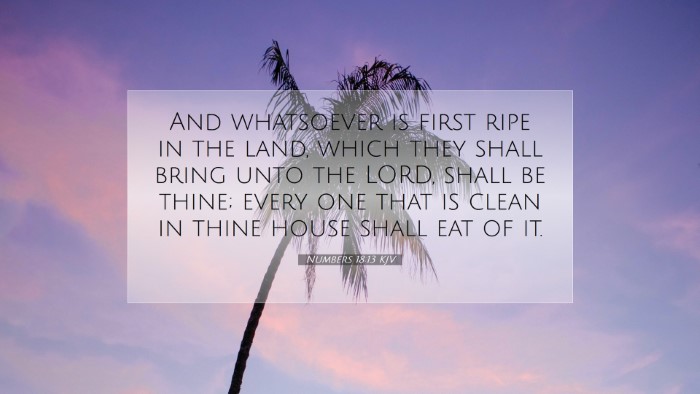Commentary on Numbers 18:13
Numbers 18:13 states: "And whatsoever is first ripe in the land, which they shall bring unto the Lord, shall be thine; every one that is clean in thine house shall eat of it." This verse emphasizes contributions and provisions allocated towards the priesthood, outlining the importance of holistically dedicating that which is first and best to God.
General Overview
This verse comes in the context of a larger discussion regarding the duties and privileges of the Levites and priests. The tribe of Levi was set apart for sacred duties, and their sustenance came primarily from contributions from the Israelites.
Insights from Public Domain Commentaries
Matthew Henry's Commentary
Matthew Henry elaborates on the significance of offerings presented to the Lord. He notes that the first fruits are an acknowledgment of God's sovereignty and provision. His commentary suggests that the phrase "first ripe" indicates not just any offering, but the best and the earliest produce, symbolizing giving one's best to God.
Henry emphasizes that the stipulation that "every one that is clean in thine house shall eat of it" points towards purity required in both the offeror and the priest—a theme that recurs throughout the Levitical laws. This calls forth the necessity of spiritual readiness in partaking of what is consecrated.
Albert Barnes' Notes
In his notes, Albert Barnes underscores that this verse serves to reinforce the priestly rights to offerings, particularly the prime produce of the land. His exposition observes that such provisions were not mere gifts, but rather divine rights bestowed upon the priesthood, setting apart the Levites as mediators of worship.
Barnes also notes that the phrase "whatsoever is first ripe" can reflect a broader theological principle: that offerings are not merely to fulfill religious obligations but should stem from gratitude and total commitment to God’s work. The unity of the community in recognizing the role of the priesthood is crucial for corporate worship.
Adam Clarke's Commentary
Adam Clarke provides a detailed etymology and historical context regarding the offerings and their significance. He mentions that the practice of offering the first fruits was deeply rooted in ancient Israelite culture, representing the people’s gratitude and their acknowledgment of God as the ultimate provider.
Clarke makes a critical point about the nature of holiness involved in these offerings. He notes that the character of the offerings must reflect the holiness of God, and thus the offerers must be mindful of their own spiritual condition, which ties back to the notion of being "clean" mentioned in the text.
Theological Implications
There are profound theological direct implications within this verse. The concept of dedicating the first and best to God highlights a principle that transcends ritual to embody an attitude towards divine worship:
- Holiness and Consecration: The priesthood's sustenance via offerings not only illustrates provision but also reflects a commitment to holiness and consecration from the people.
- Role of the Priesthood: The rights and responsibilities of the Levites reaffirm the notion that spiritual leaders must be respected and supported in their roles of mediation between God and His people.
- Community and Gratitude: The act of offering first fruits serves as a corporate act of worship that solidifies community identity with God's covenant and blessings.
- Spiritual Readiness: Emphasis on cleanliness and readiness serves as a reminder of the need for purity in approaching God with offerings.
Practical Applications for Today's Believers
The verse can inspire contemporary believers and leaders in several ways:
- Prioritize God's Work: The call to dedicate the "first ripe" can encourage Christians to prioritize their time, talents, and resources towards God's church and its missions.
- Integrity in Worship: This verse reminds believers of the necessity of approaching God in worship with sincerity and integrity, ensuring that their personal lives align with their commitments to God.
- Generosity as Worship: Embracing a lifestyle of generosity towards church leaders and the community can be a tangible reflection of gratitude for God’s blessings.
- Encourage Spiritual Readiness: Members of the church are called to maintain a clean heart and life, preparing themselves for meaningful engagement in worship and service.
Conclusion
Numbers 18:13 thus offers multifaceted insights into the nature of offerings, spiritual leadership, and community worship, serving as a timeless directive that resonates with both historical understanding and modern practice. As one contemplates this verse, it becomes essential to recognize the broader narrative of holiness, community engagement, and God's providential care.


